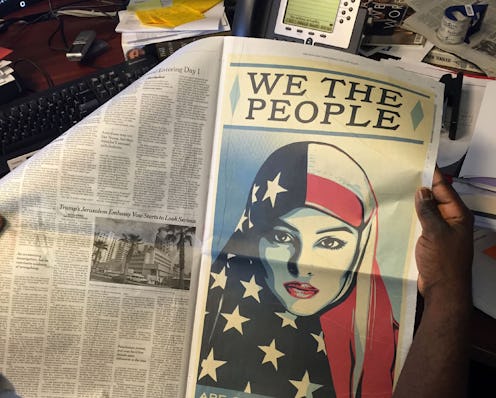
Women and men throughout the District, as well as around the country and the globe, are readily preparing for tomorrow's Women’s March on Washington and its simultaneous sister marches. In the spirit of providing inspiration for the march, here is a primer on who started the Women's March on Washington and the story behind it.
The idea for a post-Donald Trump Women's March on Washington initially derived from a Facebook Post made by a Hawaii-based grandmother named Teresa Shook. According to the Women's March official Facebook group, Shook wrote a Facebook post on the day after Trump's election expressing her frustration with his victory. She then created a related Facebook event, proposing "a call to action to forty of her friends to march in Washington, D.C." The Facebook invite quickly spread, especially after it was posted in the Pantsuit Nation Facebook group, which boasts nearly 4 million Facebook followers.
In the first 24 hours of the event's creation, over 10,000 people said they would attend the march. Similar events began cropping up on Facebook, with thousands of individuals also committing to attend. Eventually, all of these women's advocacy-oriented Facebook events merged into one collective initiative, which eventually became known as the Women's March on Washington.
Once efforts to merge the various women's advocacy Facebook initiatives and ensure inclusivity were finalized, four diverse and talented individuals were brought on as national co-chairs for the march. According to popsugar, the co-chairs include New York gun control activist Tamika Mallory, Arab American Association of New York executive director Linda Sarsour, Gathering for Justice leader Carmen Perez, and fashion designer Bob Bland.
In the months after the election, March organizers strove to carve out a platform and program for the march, with with a strong focus on inclusivity and intersectionality. Indeed, last week, the Women's March released an official four-page policy platform which Slate's Christina Cauterucci heralded as an "unapologetically radical, progressive vision for justice in America, placing the march in the context of other past and ongoing movements for equality."
In addition to the National March, in the months after Trump's election, hundreds of simultaneous sister marches were also organized by volunteers around the country and world. Currently, 673 sister marches are slated to take place on Saturday, along with the Women's March on Washington.
It is pretty amazing that a Facebook post and some highly dedicated individuals helped spark what has now become a massive global day of action for women's advocacy. Whether you are marching in-person or in spirit tomorrow, make sure to keep in mind all of the individuals whose ideas, organizing, and activism contributed to making tomorrow's historic march a reality.